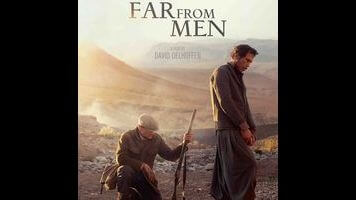Viggo Mortensen takes another long, mythic walk in Far From Men

Nobody moseys like Viggo Mortensen. In The Road, Appaloosa, Jauja, and the new French Western Far From Men, the erstwhile Aragorn masters the tricky art of being a figure in the landscape. When it comes to traipsing either purposefully or desperately across the widescreen frame, he’s several lengths ahead of the competition, the same way that Tom Cruise always laps his rivals in the mad-100-yard-dash section of the movie-star Olympics. As a French-speaking High Plateau schoolteacher unexpectedly charged with transporting a prisoner for sentencing in the remote village of Tinguit, Mortensen walks with the practiced tread of an ex-military man so softened by civilian life that he’s vulnerable to the elements. He’s just tenderfoot enough to be in trouble.
Far From Men derives its two-men-in-the-desert setup and early ’50s timeframe from Albert Camus’ short story The Guest, which was written explicitly as an allegory of French-Algerian tensions in the years after World War II. Writer-director David Oelhoffen takes plenty of liberties with his source material—turning it from a chamber piece to an open-air road movie, including skirmishes with groups on both sides of the civil war—without eliding its existential dimension. Mortensen’s Daru is a man given to wondering about his place in the world, while his captive, Mohamed (Zero Dark Thirty’s Reda Kateb) is in a situation that doesn’t permit such luxuries as self-reflection. Daru’s concerns about serving as a stranger’s chaperone stem not only from the disruption of his routine, but a complex sense of guilt about his status as the descendant of Spanish settlers. He’s a different kind of outsider in a country composed almost entirely of contested territory.
The actual physical locations in Far From Men are stunning, and Oelhoffen smartly emphasizes the emptiness of the desert, which seems to stretch on infinitely behind the characters. The drawback of this magisterial approach is that it gradually miniaturizes the human drama. While Mortensen is excellent in a role that requires him to act in French (after his flawless Danish in Jauja) Daru’s arc feels pretty flat—he begins and ends the film in a state of humble isolation. Kateb arguably has the more difficult role, and he manages the character’s shift from head-hung surrender to upstanding morality with aplomb. Revelations about Mohamed’s actions keep him from seeming simply like a nobly doomed post-colonial victim.
Guilliame Deffontaines, who shot Bruno Dumont’s great policier Li’l Quinquin, contributes evocative, natural-light cinematography that keeps slipping into darkness (a few scenes are pitch-black). The other outstanding element is the score, by Warren Ellis and Nick Cave, who have slathered many a neo-Western in turgid mood music but gracefully hold back here, crafting a soundscape that’s subtle and yet all-encompassing—a spartan sonic space with plenty of room to rattle around in.